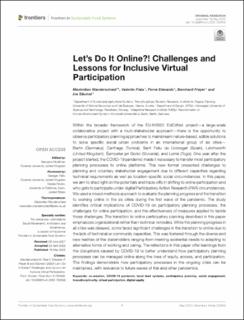| dc.contributor.author | Manderscheid, Maximilian | |
| dc.contributor.author | Fiala, Valentin | |
| dc.contributor.author | Edwards, Ferne | |
| dc.contributor.author | Freyer, Bernhard | |
| dc.contributor.author | Säumel, Ina | |
| dc.date.accessioned | 2022-12-05T12:52:31Z | |
| dc.date.available | 2022-12-05T12:52:31Z | |
| dc.date.created | 2022-05-16T15:38:11Z | |
| dc.date.issued | 2022 | |
| dc.identifier.citation | Frontiers in Sustainable Food Systems. 2022, 6 (732943), 1-15. | en_US |
| dc.identifier.issn | 2571-581X | |
| dc.identifier.uri | https://hdl.handle.net/11250/3035872 | |
| dc.description.abstract | Within the broader framework of the EU-H2020 EdiCitNet project—a large-scale collaborative project with a multi-stakeholder approach—there is the opportunity to observe participatory planning approaches to mainstream nature-based, edible solutions to solve specific social urban problems in an international group of six cities—Berlin (Germany), Carthage (Tunisia), Sant Feliu de Llobregat (Spain), Letchworth (United Kingdom), Šempeter pri Gorici (Slovenia), and Lomé (Togo). One year after the project started, the COVID-19 pandemic made it necessary to transfer most participatory planning processes to online platforms. This new format presented challenges to planning and voluntary stakeholder engagement due to different capacities regarding technical requirements as well as location-specific social circumstances. In this paper, we aim to shed light on the potentials and trade-offs in shifting to online participation and who gets to participate under digital Participatory Action Research (PAR) circumstances. We used a mixed-methods approach to evaluate the planning progress and the transition to working online in the six cities during the first wave of the pandemic. The study identifies critical implications of COVID-19 on participatory planning processes, the challenges for online participation, and the effectiveness of measures applied to tackle those challenges. The transition to online participatory planning described in this paper emphasizes organizational rather than technical remedies. While the planning progress in all cities was delayed, some faced significant challenges in the transition to online due to the lack of technical or community capacities. This was fostered through the diverse and new realities of the stakeholders ranging from meeting existential needs to adapting to alternative forms of working and caring. The reflections in this paper offer learnings from the disruptions caused by COVID-19 to better understand how participatory planning processes can be managed online along the lines of equity, access, and participation. The findings demonstrate how participatory processes in the ongoing crisis can be maintained, with relevance to future waves of this and other pandemics. | en_US |
| dc.language.iso | eng | en_US |
| dc.publisher | Frontiers | en_US |
| dc.rights | Navngivelse 4.0 Internasjonal | * |
| dc.rights.uri | http://creativecommons.org/licenses/by/4.0/deed.no | * |
| dc.title | Let’s Do It Online?! Challenges and Lessons for Inclusive Virtual Participation | en_US |
| dc.title.alternative | Let’s Do It Online?! Challenges and Lessons for Inclusive Virtual Participation | en_US |
| dc.type | Peer reviewed | en_US |
| dc.type | Journal article | en_US |
| dc.description.version | publishedVersion | en_US |
| dc.source.pagenumber | 1-15 | en_US |
| dc.source.volume | 6 | en_US |
| dc.source.journal | Frontiers in Sustainable Food Systems | en_US |
| dc.source.issue | 732943 | en_US |
| dc.identifier.doi | 10.3389/fsufs.2022.732943 | |
| dc.identifier.cristin | 2024945 | |
| cristin.ispublished | true | |
| cristin.fulltext | original | |
| cristin.qualitycode | 1 | |

